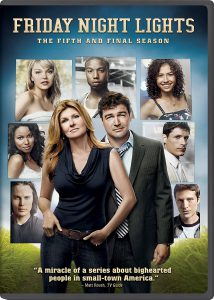I’m not married and I know that if I ever lived in Texas I’d die from the heat, yet I always respected “Friday Night Lights,” TV’s best show about marriage and best show about Texas. On Friday on NBC (and before that on DirecTV and on DVD), it bowed out after five seasons with a confident 90-minute episode that firmly reiterated that the series wasn’t about the game of Texas high school football, it was about the culture of Texas high school football.
What a stylish final sequence: As Vince (Michael B. Jordan) throws a last-second Hail Mary in the state championship game, we jump ahead eight months to see how everyone’s lives, football-oriented or not, have moved forward. During the montage, we glimpse an East Dillon state title banner, but we never cut back to the catch being made in the end zone; that — show-makers Peter Berg and Jason Katims definitively tell us — is beside the point.
The job of football coach, even at the high school level, is placed on such a pedestal by society that even Eric (Kyle Chandler) had bought into it. But Tami (Connie Britton) tells him “I’ve been a coach’s wife for 18 years. It’s my turn,” meaning that they should move to Philadelphia so she can accept her dream job as a college dean of admissions, rather than Coach taking over the “Super Team” (the co-op between East Dillon and Dillon). Marriage is about compromise, it’s often said, but so many TV shows write an easy way out of disagreements. Here, though, after much internal struggle, Eric agrees to go to Philly, and it feels real.
And besides, it’s not like he has to give up his career; he lands a coaching job there. His team — much like Season 4’s Lions — is no Super Team, but Eric says “We’ve got a lot of work to do … and I’m looking forward to it.” For him, coaching isn’t about winning state titles, it’s about molding fine young citizens, but he needed to get away from Super Team-obsessed Dillon to see that clearly.
Other scenes from the finale evoke the other half of the show’s magic: the Lone Star State, where “Friday Night Lights” is filmed. Matt (Zach Gilford) proposes to Julie (Aimee Teegarden) outside the Alamo Freeze, later telling skeptical friends that it was a “sentimental” location. Tim Riggins (Taylor Kitsch) and Tyra (Adrianne Palicki) sit on Tim’s land and watch the sunset; later the Riggins brothers build a house there, toasting “Texas forever.”
“Friday Night Lights” was always a top 10 show for me, but never a No. 1 show. It got the broad strokes beautifully right, but the specifics were sometimes cringe-worthy. So Tim got to keep the land he acquired with illegal funds? So Luke (Matt Lauria) was a freshman last year, and now he’s a senior? So every single game goes down to the final seconds? And it will always bother me that Season 2 ended in the middle of the story and the character arcs were ignored as if they never happened. Is there an unspoken agreement to never talk about the fact that Landry killed a man?
With those complaints officially logged, I admit that “FNL” did a much better (read: much less ridiculous) job with the football stuff in this final year. Vince’s dad (Cress Williams) shopping his kid — still a junior — to various colleges was an effective take on the Cam Newton situation. And Jess’ (Jurnee Smollett) input to the coaches — as she fought the uphill battle to become a respected female coach — made solid strategic sense.
Mostly though, Season 5 succeeded because “FNL” distanced itself from football specifics like never before; the on-field stuff had always gotten less screen time, but this year the writers stopped apologizing for that.
Granted, one could quibble about the generic nature of some of the plots: Vince’s dad is an alcoholic. Julie sleeps with her teacher. Buddy’s kid is lazy. And as it juggled dozens of characters (balancing current and former players), “FNL” didn’t deliver strong resolutions to all of the arcs. What ever happened to Epic, the troubled foster girl that Tami took under her wing? And didn’t it seem like Hastings Ruckle was going to be more of a major character?
However, “FNL” got marriage right: The Taylors’ house looked lived-in and slightly too messy, because — of course — coaching and guidance counseling and raising a baby don’t leave much time for cleaning. Extending that observation, the coach’s office always looked like a coach’s office, the locker room always looked like a locker room, the Riggins house always looked like the Riggins house, and so forth. The hand-held camera work played a part in selling all of this.
And Texas always looked like Texas, a state that doesn’t rush to be on the cutting edge of anything yet has a firm grasp on the values of family and community (and, for better or worse, religion).
I’m not crushed that “FNL” is ending — I feel like it had a great five-year run, much longer than other shows of similar quality and similar ratings. Still, maybe when the next “football season” rolls around (in regards to NBC’s airing of “FNL,” that would be in the spring) maybe I’ll feel like something’s missing: Real relationships, a real state, real culture, real car-salesmen-turned-athletic-boosters. You don’t get those things with every TV show, and in that sense, everything really was bigger and better in Texas.


